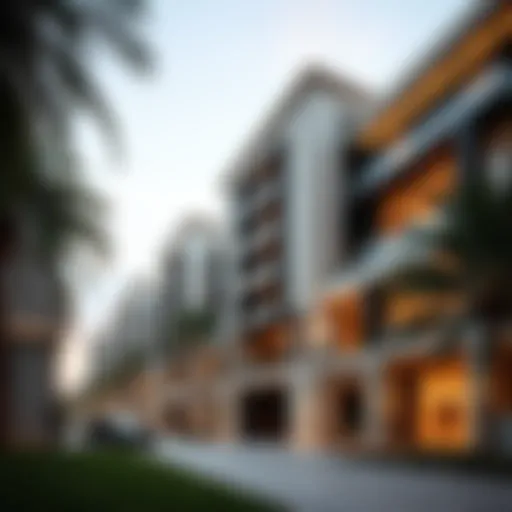Understanding Expenses in Dubai: A Comprehensive Guide


Intro
Dubai, a dazzling gem of the Middle East, epitomizes modern luxury while basking in its rich cultural heritage. As the skyline juts dramatically into the heavens, it stands as a monument to what can be achieved with vision and ambition. However, beneath the glimmering surface lies a complex financial tapestry that both entices and challenges residents, investors, and visitors alike. This article aims to break down the components that elevate costs in the city, while also providing insight into the savvy investment landscape that characterizes this vibrant metropolis.
With its rapid development, the economic dynamics of Dubai are constantly shifting. Therefore, understanding these nuances is crucial for anyone contemplating a move or investment in this glittering oasis. From exorbitant property prices to dining costs that can make your wallet feel a bit lighter, our exploration will cover it all. Not to mention, the pulse of the city influences lifestyle choices, playing a significant role in the expenses that come with residing in Dubai. As we venture through each sector, expect a solid comparison with other global cities, allowing us to paint a clearer picture of Dubai's unique financial milieu.
This journey will dive into the vital market trends, investment opportunities, and expenses associated with living in Dubai—empowering you with a well-rounded comprehension to navigate its financial landscape effectively.
Prolusion to Dubai's Economic Status
Understanding Dubai's economic status is crucial for anyone considering living or investing in this fast-paced metropolis. The city has carved out a distinct position on the global stage through a blend of strategic planning, vast resources, and a vision that extends far beyond its sandy borders. This section will delve into key elements that underpin the financial landscape of Dubai, providing a foundational knowledge for grasping the broader implications of expenses in this dynamic locale.
The Economic Framework of Dubai
Dubai's economy is a tapestry woven from the threads of diverse sectors including tourism, trade, real estate, and finance. At the heart of this framework lies the Dubai Economic Council, which focuses on fostering economic development and sustainability. With zero income tax and no specific corporate tax regime, the emirate attracts a plethora of international businesses.
The city's economic strategy revolves around the diversification away from oil dependency. Nowadays, oil contributes a mere fraction to the GDP, with tourism being the golden egg. Business-Friendly regulations facilitate smooth operations for companies, encouraging innovation and entrepreneurship. The arrival of events like Expo 2020 serves as a testament to Dubai’s commitment to elevating its global profile. An influx of tourists and business travelers during such events creates ripples in various sectors, particularly hospitality and retail.
It's essential to consider how these economic foundations shape the cost of living in Dubai. For instance, sectors that experience rapid growth often lead to increased demand for housing and services, naturally pushing prices up.
Dubai's Global Financial Standing
Dubai holds a prominent spot in global financial rankings, frequently vying with major cities like New York and London for attention. Its strategic location—acting as a gateway between the East and West—enhances its attractiveness to international investors. Many multinational companies choose Dubai as a regional headquarters, solidifying its role as a business hub.
The Global Financial Centres Index consistently ranks Dubai as one of the top financial centers in the world, thanks to a robust banking system, a flourishing stock market, and an overall conducive environment for investment. Furthermore, the Dubai International Financial Centre (DIFC) offers a wealth of opportunities for financial services, making it an appealing venue for investment ventures.
In summary, the financial backdrop of Dubai operates on principles that not only aim to stimulate growth but also reflect the emirate's ambition to become a global powerhouse. Understanding this economic setup is key for potential investors and residents, as it directly influences living expenses, market trends, and the overall investment climate in the city.
"Dubai's ability to diversify its economy has allowed it to transform into a global financial hub, influencing both its citizens and investors worldwide."
Understanding these layers gives one clarity on how expenses in Dubai are shaped, ultimately paving the way for informed decisions whether purchasing property, choosing a business venture, or considering relocation.
Cost of Living in Dubai
Understanding the cost of living in Dubai is crucial for anyone considering a move or investment in this bustling metropolis. The perception of Dubai as an expensive city isn't just rumor; it is a reality highlighted by various factors, including housing, food, and transportation. This section focuses on key elements that shape the financial landscape of living in Dubai.
Homebuyers, expats, and investors alike must grasp these expenses to make informed decisions that align with their financial capabilities and life goals. As the city continues to evolve, keeping an eye on these expenses can provide insights on where to allocate resources, whether for residential living or investment opportunities.
Housing Costs
Housing is often the largest part of one's budget in Dubai. Its costs vary significantly by neighborhood and type of home. Understanding these nuances can help residents and potential buyers find accommodations that fit their financial situations.
Rental Prices in Different Neighborhoods
Renting in Dubai offers a wide range of choices, from luxury apartments in Dubai Marina to budget-friendly accommodations in areas like Deira. The differences in rental prices across neighborhoods can be striking. For example,
- Dubai Marina boasts high-end living with abundant amenities, targeting those who prioritize a lavish lifestyle. Expect to cough up a pretty penny here.
- Deira, on the other hand, provides more affordable options while still being centrally located.
The key characteristic of rental prices reshaping the city's demographic landscape is the adaptability of neighborhoods. More families are opting for areas that provide a community feel at a lower cost, while young professionals flock to the more vibrant, bustling communities. This aspect is vital as it offers a mix of lifestyle choices suitable for various budgets.
Comparison of Buying vs. Renting
Whether to buy or rent is a popular debate among new residents. Each option carries its own merits and drawbacks. The key characteristic that stands out in this discussion is the investment potential. Buying property in Dubai can be lucrative, especially in developing areas where prices are projected to rise. However, this means a significant upfront investment.
On the flip side, renting offers more flexibility and is preferable for those not ready to commit financially or those who plan just a short stay. Importantly, understanding local market timelines, legalities, and associated costs (like annual maintenance) can help guide this decision.
Impact of Market Trends
The real estate market in Dubai is influenced by line shifts in economic conditions. Such trends can dictate everything from rental prices to property appreciation rates. A key characteristic of market trends is the cyclical nature typical in dynamic economies. Breaking down these trends reveals:


- Shifting demand resulting from changing demographics, which can either inflate or deflate prices.
- Seasonal fluctuations where new developments might affect availability.
Recognizing these trends can equip investors with the knowledge needed to make strategic decisions. Timing the market effectively can lead to advantageous investments or substantial savings on housing costs.
Dining Expenses
Dining expenses in Dubai also reflect a varying scale and can significantly impact one's overall cost of living. There is a delightful diversity of options available to residents, but not all come at an evenly spread price.
Cost Variations Across Different Cuisines
From street food to high-end restaurants, catering to global tastes is a strength. The key characteristic of dining costs involves the breadth of choices available. Residents can opt for inexpensive shawarma joints or splurge on exquisite dining experiences at restaurants like Al Mahara.
Dining out can get pricey quickly, particularly if one frequents tourist hotspots. Understanding these cost variations can help individuals make more informed dining choices, allowing for better budgeting.
Fine Dining vs. Casual Eats
Another distinct layer of dining expenses lies between fine dining experiences and casual eats. Meals at upscale establishments in Dubai can cost considerably more than typical takeout. The allure of the culinary scene can make fine dining tempting but learning to strike a balance is crucial. Casual dining often provides a chance to enjoy quality meals without financial strain, making it a wise choice for regular dining.
Impact of Expat Culture on Dining Costs
The diverse expat culture undeniably shapes dining costs. With a significant portion of the population being expatriates, the demand for international cuisine has surged. The key characteristic of this impact is heightened pricing in restaurants that cater to diverse tastes. Understanding these influences signifies how meals reflect not just a culinary experience but community dynamics, potentially contributing to pricy options.
Transportation Costs
Transportation within Dubai is another essential consideration that impacts overall living expenses.
Public Transport Accessibility
Dubai's public transport system is touted as efficient and user-friendly, generally more cost-effective than other transportation means. Utilizing the Metro can be an excellent way to navigate the city without breaking the bank. However, the key characteristic lies in its coverage—the broader it spans, the more accessible it becomes, removing some of the pains associated with other forms of transport.
Car Ownership and Fuel Prices
Owning a car is appealing in Dubai but comes with its own set of financial obligations. Key characteristics revolve around fuel prices, insurance costs, and maintenance. The petrol prices are lower compared to many Western nations, easing some burden, yet the initial costs of purchasing a vehicle and potential financing must be weighed carefully.
Ride-hailing Services Costs
Ride-hailing services have grown in popularity, drawing in both residents and tourists. Costing tends to vary depending on time and distance, making it a convenient option with some degree of reliability. However, expenses could add up quickly if frequently relied upon. Knowing the average fares in advance can provide a better gauge on budgeting for transportation needs in Dubai.
Factors Contributing to High Expenses
Understanding the complexities that shape Dubai's pricing landscape is crucial for anyone considering investing or residing in this vibrant city. The interplay between various factors contributes significantly to the livability and affordability in Dubai. This section covers two primary aspects: the vibrancy of the tourism industry and the unique dynamics of the expatriate community, both of which exert substantial influence on the overall cost of living.
Tourism and Its Financial Impact
Seasonal Influx of Tourists
The seasonal influx of tourists in Dubai is a unique facet of its economy that must be examined in detail. Each year, Dubai experiences a surge in visitors during certain periods, notably around major events such as the Dubai Shopping Festival and the winter holidays. This spike in tourism results in higher prices across various sectors, from hospitality to retail. The key characteristic of this seasonal fluctuation is not simply its timing but the sheer volume of tourists it attracts. While this boosts local economies, it also drives up prices significantly, impacting affordability for residents.
- Advantages: For local businesses, this tourism boom translates to increased revenue, often justifying the elevated prices. It fosters job creation and can stimulate the overall economy.
- Disadvantages: Conversely, for residents, this can make essential services and products more expensive. Locals may find it increasingly difficult to access affordable goods and services.
Impact on Accommodations and Services
The impact of tourism on accommodations and services is another dimension worth exploring. As visitors flock to Dubai, the demand for hotel rooms and short-term rentals skyrockets. This surge results in increased accommodation costs, with landlords and hotels capitalizing on the limited availability during peak times.
- Key characteristic: The resulting price increases can be steep, sometimes pushing even long-term residents out of affordable housing.
- Advantages: From a tourism standpoint, enhanced demand leads to better services and facilities, keeping tourists returning year after year.
- Disadvantages: However, residents may feel the pinch as temporary rentals often take precedence over long-term housing options. Many locals express concerns that their neighborhoods are becoming transient hubs, affecting the community fabric of the area.
Expat Community Dynamics
Demand-Driven Pricing Structures
The dynamics of the expatriate community in Dubai play a critical role in shaping its pricing landscape. With a large portion of the population being non-nationals, the demand for various products and services is driven by this diverse demographic. Expat residents tend to possess higher disposable income levels compared to the average local population, which influences market prices.


- Key characteristic: This demand-driven pricing structure becomes visible during periods of heavy expat activity, where services and goods are tailored more towards affluent foreigners.
- Advantages: Businesses catering to expatriates often benefit from consistent patronage, elevating their prices during periods of heightened demand.
- Disadvantages: Locals often struggle with price adjustments that reflect a tourist-focused market, leading to pricing disparities across different neighborhoods.
The Role of International Workforce
The role of the international workforce cannot be understated when discussing the financial landscape of Dubai. The presence of expatriates is not just a trend; it's a vital component of Dubai’s economic engine. The influx of skilled laborers and professionals contributes to the growth of key sectors, thus affecting overall living costs.
- Key characteristic: This international workforce often commands salaries that are significantly higher, which in turn supports higher prices for everyday items and services that might not be affordable for the typical resident.
- Advantages: The presence of such a workforce enhances the quality and variety of local services, benefitting everyone.
- Disadvantages: However, residents may find themselves squeezed out of certain markets, as pricing fails to account for their economic realities.
"Understanding the factors influencing expenses in Dubai is essential not just for budgeting but for informed investment decisions."
Comparative Analysis with Other Global Cities
Analyzing the expenses associated with living in Dubai in relation to other global cities offers a broader perspective on its financial landscape. Such comparative studies are essential for potential residents and investors, as they highlight not just the cost of living but also the quality of life and investment potential across different environments. In the grand scheme of things, this helps individuals make informed decisions, whether they're planning to plant roots in a new city or looking to invest in global markets.
Living Costs in Major Cities
Comparison with New York
New York often showcases expenses that can leave one's wallet feeling a pinch, yet it remains a magnet for ambition and opportunity. In comparison to Dubai, housing in New York is substantially costlier, particularly in prime neighborhoods like Manhattan. However, what sets New York apart is its vibrant job market and cultural diversity, which appeal to many. The typical monthly rent for a one-bedroom apartment in the city can easily exceed $3,000, whereas Dubai might range around $1,800 in high-demand areas, making it a more budget-friendly option for expatriates.
Yet, the allure of New York also lies in its economic robustness, drawing a plethora of global investments which can bolster opportunities for career advancement. This sets a stage of contrasts; while one might save on rent in Dubai, New Yorkers benefit from networking opportunities unlike any other. The challenge remains, though, balancing what you're willing to give for what you can gain.
Comparative Study with London
London offers another fascinating comparison, especially with its distinctive charm and cultural significance. The expenses there are comparable to New York in that a central London apartment can command similar prices. However, unlike New York, London’s public transport system is incredibly extensive and reliable, often reducing the need for private vehicles.
In terms of overall living expenses, London and Dubai juxtapose sharply: while Dubai entertains a lower tax burden, London’s various taxes on properties and services add layers of predictability to expenses for its residents. Moreover, London showcases historical depth in its cultural offerings, drawing millions of tourists, thus inflating costs. Therefore, it’s imperative for prospective movers to weigh these differences carefully.
Cultural Affluence and Its Financial Implications
Cultural depth can dramatically influence financial commitments and living experiences. In cities like London and New York, rich histories and diverse cultures come with a price. Dubai, while relatively young as a global city, offers a blend of modern architecture, traditional markets, and innovative attractions, all of which affect its cost profile.
The cultural affluence found in these established cities can lead to enhanced lifestyle choices, yet this often comes at premium prices. While Dubai may lack the centuries of history, it plays host to extravagant events and attractions, which increase local expenditures. Thus, it’s crucial to assess how cultural offerings affect your financial habits when considering a move to any global city.
Investment Potential Compared to Other Markets
Real Estate Returns in Dubai vs. Global Hotspots
Dubai's real estate market has shown a penchant for rapid growth and high returns, particularly when you analyze it against competitive markets like London and New York. Investors have long been captivated by the no capital gains tax policy on property in Dubai, enhancing its attractiveness.
When discussing returns, one must factor in the volatility of these markets. While New York real estate consolidates value, the rapid price fluctuations in Dubai can yield fruitful returns in a matter of years. Investors should remain cautious, closely monitoring market dynamics and aligning their portfolios with areas that showcase development and populace growth.
Long-term Growth Forecasts
When considering long-term growth forecasts, Dubai stands out for its proactive initiatives in diversifying its economy. Beyond oil revenues, strong investments in tourism and technology are shaping a promising outlook for future residents and investors alike.
In comparison to saturated markets like London, which are subject to economic cyclicality and potential downturns, Dubai's growth trajectory is sustained by a younger, vibrant population and continued infrastructural developments. Observing how global economies are shifting towards the Middle East may provide a glimpse into potentially lucrative prospects for those examining investments in various sectors diving into the future.
Strategies for Managing Expenses
Understanding how to manage expenses is vital for anyone living in or investing in Dubai. The city is known for its extravagant lifestyle, but with proper strategies, residents and newcomers can navigate the high costs more effectively. Knowing where to cut back and where to allocate more resources can make all the difference.
Budget Planning for Residents
Essential Expenses vs. Luxury Spending
Budgeting is a crucial first step for anyone looking to live comfortably in Dubai. Essentials—like housing, utilities, and groceries—need to be prioritized over luxury expenses, which often include dining out at high-end restaurants or shopping for designer goods.
The key characteristic of distinguishing essential expenses from luxury spending is that essentials are indispensable for daily life, while luxuries are more about personal pleasure. This clear separation allows residents to live within their means while still enjoying what the city has to offer.
It's often a beneficial choice to draw a hard line between needs and wants to avoid falling into financial pitfalls.


"By carefully evaluating what you really need against what you want, you'll find that maintaining a balanced budget can enhance your quality of life while in this wealthy city."
On the flip side, the unique feature of being in a luxurious city like Dubai is the endless temptation to indulge. While there are certainly opportunities to enjoy fine dining or extravagant entertainment, it is essential to remember that moderation is key. Sensible budgeting means that individuals can occasionally treat themselves without breaking the bank.
Utilizing Local Resources for Cost Efficiency
Another effective strategy involves taping into local resources. Dubai has a number of initiatives aimed at helping residents and expats save money. From discounted transport passes to community events that are free or low-cost, understanding local opportunities is paramount.
The key characteristic of utilizing local resources is their availability; many expats are unaware of these options, which can lead to unnecessary expenditures. This approach not only allows for better expense management but also enhances community engagement.
Engaging with local communities by attending outdoor markets or cultural events can provide both entertainment and savings. In a city known for its lavish lifestyle, finding cost-efficient alternatives can be a popular choice among those managing their finances.
One important advantage of this strategy is that it fosters a sense of belonging in a new city. However, if someone strictly sticks to high-end options, they might miss out on the rich cultural experiences Dubai has to offer.
Investment Decisions in a Costly Market
Identifying Growth Areas
In a fluctuating market like Dubai, identifying growth areas can significantly impact investment decisions. Analyzing trends in different neighborhoods and emerging sectors is essential for any potential investor.
The key characteristic of growth in specific areas often relates to infrastructure developments or upcoming projects that promise to enhance property values. This vigilance can lead to substantial returns on investment.
Locating opportunities where the demand for housing is set to increase can be a beneficial choice; as expansions in public transport or retail facilities arise, so does the likelihood of real estate appreciation.
However, the unique feature of investing in growth areas is the inherent risk involved. Not all projected growth materializes, which is why thorough research and caution are necessary to ensure sound investment decisions.
Smart Purchases Based on Market Insights
Making informed purchases based on market insights can turn a hefty initial investment into long-term gains. The market in Dubai is like a fickle friend—sometimes warm and inviting, and at others, just a bit treacherous. Analyzing market data and working with knowledgeable agents can mean the difference between securing a property at a good price and missing out entirely.
The key characteristic of making smart purchases revolves around timing and information. Knowing when to buy can yield substantial savings, especially as different sectors fluctuate.
This beneficial approach requires continuous engagement with market trends and forecasts. Regularly reading reputable financial analysis or engaging in discussions with experts can bolster understanding, ultimately leading to wise purchase decisions.
The advantage lies in the potential for increased property value over time, making it a strategy well-suited for investors looking to maximize their investment in a costly market like Dubai.
Epilogue: Understanding Dubai's Expense Landscape
As we draw the curtains on our exploration of Dubai's expense landscape, it's clear that getting a grip on the financial dynamics of this bustling metropolis is crucial for anyone considering a move or investment here. The expense spectrum—from housing to transportation—affects not only one’s lifestyle choices but also investment opportunities.
Understanding costs sheds light on the broader economic framework of the city. For example, the constantly fluctuating real estate market can entice investors, while at the same time, presenting challenges for potential residents trying to find affordable housing. This duality makes it essential to dissect each component in the expense narrative.
Moreover, knowledge of how costs fluctuate seasonally can aid in smarter budgeting. Whether it’s navigating the rental trends or the price of an evening out, a keen awareness of these factors can influence both day-to-day living and long-term planning decisions.
"Navigating expenses in this dynamic city requires a blend of insight and prudence to capitalize effectively in its ever-shifting landscape."
In short, comprehending Dubai's financial landscape equips investors and residents alike with the tools needed to make sound, informed decisions, contributing to a more enriching experience in this vibrant city.
Final Thoughts on Dubai's Value Proposition
In light of the insights shared, one must consider why Dubai continues to be an appealing destination despite its high costs. The city is not merely a place to live; it signifies opportunity. With notable tax advantages, an ever-expanding job market, and a lifestyle teeming with cultural diversity, it's a unique proposition.
For instance, the potential returns on investments in Dubai's real estate market can still outperform many major global cities, making it an attractive option for high-level investors. Additionally, living in neighborhoods like Dubai Marina or Downtown Dubai offers high-quality amenities that could justify the higher costs.
Ultimately, the value proposition of Dubai extends beyond its price tags; it encompasses the quality of life and opportunities each area presents.
Future Outlook on Expenses in Dubai
Looking ahead, the trajectory of expenses in Dubai is as unpredictable as the city itself. With ongoing development projects, changes in the global economy, and shifts in local policies regarding taxation and real estate regulations, it’s imperative for investors and residents to stay informed.
Analysts predict an upward trend in rental prices due to the influx of population and tourists, yet there are also indications that certain housing markets might stabilize, offering buyers a window of opportunity. For the transportation sector, improvements in public transport infrastructure could ease travel costs for residents in the long run.
Furthermore, as the city solidifies its reputation as a premier global business hub, there is a likelihood that demand for commercial properties will elevate both expenses and investment appeals.
In summary, the future of expenses in Dubai hinges on several variables, and maintaining a pulse on these shifts could greatly benefit those with vested interests in the city.
Stay tuned with local news and reports on economic trends by visiting resources like Dubai Statistics Center or Khaleej Times.















